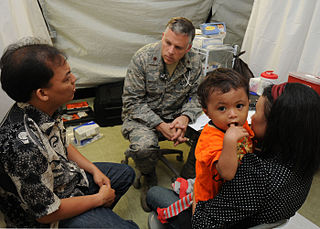Related Research Articles

Parenting or child rearing is the process of promoting and supporting the physical, emotional, social, and intellectual development of a child from infancy to adulthood. Parenting refers to the intricacies of raising a child and not exclusively for a biological relationship.

Ethnography is a branch of anthropology and the systematic study of individual cultures. Ethnography explores cultural phenomena from the point of view of the subject of the study. Ethnography is also a type of social research involving the examination of the behaviour of the participants in a given social situation and understanding the group members' own interpretation of such behaviour.
Medical anthropology studies "human health and disease, health care systems, and biocultural adaptation". It views humans from multidimensional and ecological perspectives. It is one of the most highly developed areas of anthropology and applied anthropology, and is a subfield of social and cultural anthropology that examines the ways in which culture and society are organized around or influenced by issues of health, health care and related issues.
Abnormal psychology is the branch of psychology that studies unusual patterns of behavior, emotion and thought, which may or may not be understood as precipitating a mental disorder. Although many behaviors could be considered as abnormal, this branch of psychology typically deals with behavior in a clinical context. There is a long history of attempts to understand and control behavior deemed to be aberrant or deviant, and there is often cultural variation in the approach taken. The field of abnormal psychology identifies multiple causes for different conditions, employing diverse theories from the general field of psychology and elsewhere, and much still hinges on what exactly is meant by "abnormal". There has traditionally been a divide between psychological and biological explanations, reflecting a philosophical dualism in regard to the mind-body problem. There have also been different approaches in trying to classify mental disorders. Abnormal includes three different categories; they are subnormal, supernormal and paranormal.
Palliative care is an interdisciplinary medical caregiving approach aimed at optimizing quality of life and mitigating suffering among people with serious, complex illness. Within the published literature, many definitions of palliative care exist; most notably, the World Health Organization describes palliative care as "an approach that improves the quality of life of patients and their families facing the problems associated with life-threatening illness, through the prevention and relief of suffering by means of early identification and impeccable assessment and treatment of pain and other problems, physical, psychosocial, and spiritual." In the past, palliative care was a disease specific approach, but today the World Health Organization takes a more broad approach, that the principles of palliative care should be applied as early as possible to any chronic and ultimately fatal illness.
Community psychology studies the individuals' contexts within communities and the wider society, and the relationships of the individual to communities and society. Community psychologists seek to understand the quality of life of individuals within groups, organizations and institutions, communities, and society. Their aim is to enhance quality of life through collaborative research and action.
Mental health, defined by the World Health Organization (WHO), is "a state of well-being in which the individual realizes his or her own abilities, can cope with the normal stresses of life, can work productively and fruitfully, and is able to make a contribution to his or her community". According to the WHO, mental health includes "subjective well-being, perceived self-efficacy, autonomy, competence, intergenerational dependence, and self-actualization of one's intellectual and emotional potential, among others". From the perspectives of positive psychology or of holism, mental health may include an individual's ability to enjoy life and to create a balance between life activities and efforts to achieve psychological resilience. Cultural differences, subjective assessments, and competing professional theories all affect how one defines "mental health".
Critical medical anthropology (CMA) is a branch of medical anthropology that blends critical theory and ground-level ethnographic approaches in the consideration of the political economy of health, and the effect of social inequality on people's health. It puts emphasis on the structure of social relationships, rather than purely biomedical factors in analyzing health and accounting for its determinants.
Children's culture includes children's cultural artifacts, children's media and literature, and the myths and discourses spun around the notion of childhood. Children's culture has been studied within academia in cultural studies, media studies, and literature departments. The interdisciplinary focus of childhood studies could also be considered in the paradigm of social theory concerning the study of children's culture.
Cultural competence, also known as intercultural competence, is a continuous and life long journey to increase people's skills in being proficient in intercultural and intra cultural knowledge which can improve the ability to work with people with different culture.
Psychological anthropology is an interdisciplinary subfield of anthropology that studies the interaction of cultural and mental processes. This subfield tends to focus on ways in which humans' development and enculturation within a particular cultural group—with its own history, language, practices, and conceptual categories—shape processes of human cognition, emotion, perception, motivation, and mental health. It also examines how the understanding of cognition, emotion, motivation, and similar psychological processes inform or constrain our models of cultural and social processes. Each school within psychological anthropology has its own approach.
Cross-cultural psychiatry is a branch of psychiatry concerned with the cultural context of mental disorders and the challenges of addressing ethnic diversity in psychiatric services. It emerged as a coherent field from several strands of work, including surveys of the prevalence and form of disorders in different cultures or countries; the study of migrant populations and ethnic diversity within countries; and analysis of psychiatry itself as a cultural product.
Clinical ethnography is a term first used by Gilbert Herdt and Robert Stoller in a series of papers in the 1980s. As Herdt defines it, clinical ethnography
is the intensive study of subjectivity in cultural context...clinical ethnography is focused on the microscopic understanding of sexual subjectivity and individual differences within cross-cultural communities. What distinguishes clinical ethnography from anthropological ethnography in general is (a) the application of disciplined clinical training to ethnographic problems and (b) developmental concern with desires and meanings as they are distributed culturally within groups and across the course of life.
Biocultural anthropology can be defined in numerous ways. It is the scientific exploration of the relationships between human biology and culture. "Instead of looking for the underlying biological roots of human behavior, biocultural anthropology attempts to understand how culture affects our biological capacities and limitations."
The developmental niche is a theoretical framework for understanding and analyzing how culture shapes child development. Developed by Charles M. Super and Sara Harkness. It is theoretically related to, and shares some origins with, Weisner’s “ecocultural niche,” and Worthman’s “developmental microniche.” See also "evolved developmental niche."
The Foundation for Psychocultural Research is a 501(c)(3) nonprofit organization based in Los Angeles that supports and advances interdisciplinary and integrative research and training on interactions of culture, neuroscience, psychiatry, and psychology, with an emphasis on cultural processes as central. The primary objective is to help articulate and support the creation of transformative paradigms that address issues of fundamental clinical and social concern.
Environmental anthropology is a sub-specialty within the field of anthropology that takes an active role in examining the relationships between humans and their environment across space and time.
The following outline is provided as an overview of and topical guide to social science:
Pediatric psychology is a multidisciplinary field of both scientific research and clinical practice which attempts to address the psychological aspects of illness, injury, and the promotion of health behaviors in children, adolescents, and families in a pediatric health setting. Psychological issues are addressed in a developmental framework and emphasize the dynamic relationships which exist between children, their families, and the health delivery system as a whole.

Cultural competence in healthcare refers to the ability for healthcare professionals to demonstrate cultural competence toward patients with diverse values, beliefs, and feelings. This process includes consideration of the individual social, cultural, and psychological needs of patients for effective cross-cultural communication with their health care providers. The goal of cultural competence in health care is to reduce health disparities and to provide optimal care to patients regardless of their race, gender, ethnic background, native languages spoken, and religious or cultural beliefs. Cultural competency training is important in health care fields where human interaction is common, including medicine, nursing, allied health, mental health, social work, pharmacy, oral health, and public health fields.
References
- 1 2 Meredith Small, Our Babies, Ourselves: How Biology and Culture Shape the Way We Parent, Anchor, 1999, ISBN 978-0-385-48362-9
- 1 2 3 Carol M. Worthman, 1995, "Ethnopediatrics: An outline Archived 2006-09-09 at the Wayback Machine ." Items 49:6-10.